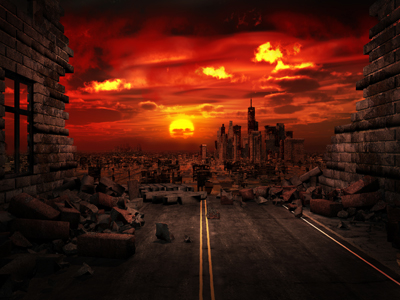
 |

|

|
I grew up with the dystopian1 novels 1984 by George Orwell and Brave New World by Aldous Huxley, and in college I studied the utopian works The Republic of Plato2 and Looking Backward by Edward Bellamy, and the dystopian We by Yevgeny Zamyatin, among others. More recently, I’ve read Suzanne Collins’s dystopian Hunger Games trilogy and seen its movie adaptations, and I’ve watched the movies of Veronica Roth’s dystopian Divergent series, although I have not yet read the books.
I understand why an author would write either a utopia or a dystopia. The former is to test out ideas about how the human condition and human society might be made better if not perfect. The latter demonstrates how, in the presence of some human failing or absent some leavening force, society might become very much worse. All of this is the proper sphere of science fiction: to envision an alternate future for humanity and the mechanisms that might drive us toward its attainment. I understand the purpose of writing a utopia or dystopia, but I’ve never tried to write one myself.
One might also see in much of our current politics, especially among American Progressives and European Socialists, a real-life attempt to erect utopia here on Earth, marked by universal and equal access to education, health care, job opportunities, plentiful goods and services, and proportionate personal wealth. In similar fashion, the goal of the early Marxists was to create a worker’s paradise of individual labor freed from the strictures of market forces, return on capital, authoritarian bosses, religious coercion, and government interference. This was also the theme of the John Lennon song Imagine: no religion, no countries, no possessions, “… nothing to kill or die for … a brotherhood of man.” And it was the drive of every 19th-century utopian commune in America that was run along socialist lines to create a separate space of equality, friendship, love, and shared physical labor.
I can understand the motive for writing such stories and dreaming such dreams. But, for me, the books and the political schemes they represent simply do not work. I don’t think I could ever write a thoroughgoing utopia or dystopia.
These books and political programs are all based on distorting human nature. In utopias, the distortion is toward a good and positive spirit of sacrifice and selflessness, which is indeed found in pure form in some human beings, but is by no means the dominant characteristic of our species. In dystopias, the distortion is usually toward a spirit of gullibility and passivity on the part of society as a whole, and callousness, manipulation, and greed among its leaders—which again marks some humans to a high degree but is not the nature of all or even most human beings. The result is that most of these stories present societies that revolve around only one political premise, one positive or negative cultural value. And most of the characters in them are mere caricatures or cartoons, reacting to that premise, sustained or squashed by that value, and not real people with complex emotions and motivations. Paintings done in two dimensions with a limited palette are boring. Music played on a simple scale without sharps or flats, or the rudiments of harmonics, is boring.
Probably the most true-to-life—and therefore most frightening—of the dystopias is 1984. Its depiction of an all-powerful state with an ever-watchful leader feels real when compared with Nazi Germany, Soviet Russia, or Communist North Korea. The protagonist Winston Smith and his paramour Julia are small, powerless, feeble in their attempted resistance, and ultimately left naked in their defeat. The mass of society is obedient to a fault, innocently accepting when people and events are written out of the history books and sent down the “memory hole.” They try eagerly to comply with the state-sponsored changes in language which make productive thought harder and harder. There is an apparently active underground, but it turns out to be only a state-sponsored fiction created to cement state control.
You read the book and despair—until you remember that even the most draconian states, like the Nazis and Soviets, had their internal resistance groups which were not state approved. Real people have a conscience and a working memory. Yes, you can imitate public allegiance through the regulation of civic action, like forced attendance at parades and regimented salutes, and the manipulation of popular speech, like substituting “Heil Hitler” for “Good morning.” Yes, you can turn some people into frightened sheep and others into social-climbing wolves. But in the privacy of the home, in the intimacy of the family, the leavening of human nature will react with doubt and scorn. The Soviets, for all their propaganda machine, oiled with the likes of the dreary newspaper Pravda and the even drearier humor magazine Krokodil, reaped a harvest of popular samizdat, or underground publications and Western music laboriously copied out or rerecorded manually and passed along from hand to hand.
Utopias and dystopias both seem to founder on questions of scale and issues of absolutism. In Ray Bradbury’s Fahrenheit 451, the prohibition on books and reading matter was so complete that, at least in the movie adaptation, people were looking at newspapers printed as comic-book imagery with empty word balloons, and they seemed to enjoy television plays with empty drama about who gets to sleep in the Blue Room. Real people don’t put up with such nonsense.3 Presumably, then, statutes and public announcements, and technical documents such as instruction manuals and operating procedures, would all be transmitted through verbal recitations and video demonstrations rather than written text.4
The matter of absolutes comes home in the idea of the perfect society having “no possessions.” I can understand how that would mean one person not owning, as his or her sole fiefdom, a chain of factories with monopoly power over some national good or service, employing hundreds of thousands of people who respond to the owner’s instructions as if they were government edicts, and paying him or her billions of dollars in profits. I can also imagine this deprecation of the human impulse toward acquisition as applying to the farm that a family works to both provide a private food source for themselves and generate a cash crop, or the corner store that a family runs to sell food and sundries to the local neighborhood while generating work for themselves and a personal income. “No possessions” might also apply to the house a person lives in or the car he or she drives, as communal housing and public transportation can be thought more equitable and efficient. But do I get to own the pants that I wear today, wash myself tonight, and then put on again tomorrow? How about my shoes or my jacket? Or the toy my child plays with and loves to distraction? Where does one draw the line when decreeing “no possessions”?
In 1984, the telescreen in every room not only played out endless exhortations and propaganda but also watched as the occupant went about his or her private business and eavesdropped on every conversation. The slightest deviation from party discipline could presumably be detected and punished. This sort of continuous surveillance was science fiction when George Orwell wrote the novel. However, as many people discovered when the Patriot Act was approved in 2001, powerful computers and the transition of our telephone system from analog copper wires to networks switching around digital packets meant that the National Security Agency and other government bodies could sample every conversation flowing through the system, pick out key words and subversive ideas, and build a case against any citizen. This was the absolute control of the 1984 telescreen brought terrifyingly to life.
Except … it’s not. Even if a network of supercomputers could analyze, weigh, and flag subversive speech among the billions of words that 320 million Americans—and about as many more foreign nationals—speak into the telephone system every day, the government prosecutors with their limited—though still impressive—resources would go crazy trying to track down and take action on every lead. Even to become a “person of interest,” a potential assassin or saboteur needs to do more than speak a few predesignated words into a telephone. And, as we’ve seen from the news analysis of recent terrorist acts, even people of interest with proof against them tend to be vetted and dismissed into a sea of suspicious but not indictable characters. Supercomputers may do the flagging, but human beings with their limited imaginations, faulty attention spans, and imperfect understanding of every situation will still do the follow-up interviews.5
The world is neither wholly good nor bad; instead, it blends both characteristics in equal measure. Human beings are neither wholly self-sacrificing and subservient, nor selfish and grasping; instead, they are a mixture of both, in different measures at different times. Emphasizing one aspect of the world, society, or human nature might make a strong point in an interesting study, but it does not make for a good story. Real people make for good stories because they are not caricatures, not entirely predictable, and they follow a story arc that the reader or viewer can only bet on but never know for certain in advance.
1. Thomas More coined the word utopia from Greek roots meaning “no place” for the title of his 1516 book.
2. Although The Republic is commonly described as a utopia, I wouldn’t want to live there. Like Thomas More’s description of an ideal island full of selfless people farming the land and being rationally distributed, and when necessary redistributed, around the countryside in groups to maintain an unnatural state of balance, Plato’s ideal city-state treats its people more like puppets than citizens: deprived of family life and private property, subjected to an educational system strong on physical conditioning and mathematics, forbidden to read poetry and fiction, and drenched in public-spirited martial music. In either situation, I would be planning my escape … and I suppose that’s the point.
3. Even American television programs—or at least those that survive past the cancellation point of their first season—have some content or features to which a conscious, self-aware, adult human being can relate.
4. When I worked as a documentation specialist in the pharmaceutical industry, the question arose about using photos and illustrations in our operating procedures—and presumably this would extend to reliance on training videos. The U.S. Food and Drug Administration regulations require written procedures, which can be cited and specifically enforced, rather than imagery and demonstrations, which are subject to the viewer’s attention span and interpretation. The force of law will still be codified in words.
5. But with all of this, I cannot account for North Korea. There the population lives in primitive darkness—see the nighttime satellite photos of a blacked-out country—under gulag conditions, and on the edge of starvation. The Kim family and their military supporters seem to have achieved total, interpersonal, locked-down control of the country in the sixty-odd years since the Korean War ended. Perhaps you cannot breed humans into self-sacrificing sheep, but in three generations of unrelenting surveillance and punishment you can shape them into mice that hide from the daylight.